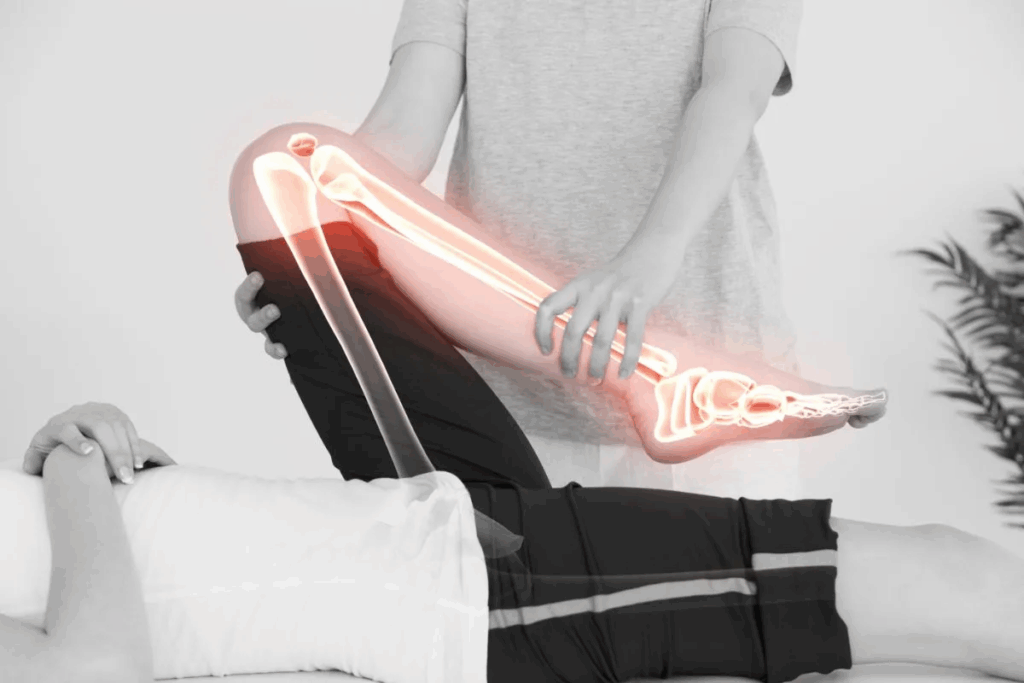Last Updated on November 4, 2025 by mcelik

Tendonitis affects millions worldwide, causing pain and limiting mobility. Proper hydration is key for healthy tendons and healing. It’s often caused by repetitive motions, sudden injuries, or certain medical conditions. This leads to inflammation and pain in the tendons, which connect muscles to bones.The Amazing link between drinking water tendonitis healing. Can a glass of water really help your recovery?
We look into how hydration affects tendon health. We examine the scientific evidence and offer practical tips for using hydration to aid recovery. Knowing how hydration helps tendons is vital for effective prevention and treatment.
Knowing about tendonitis is key to managing and recovering from it. It affects tendons all over the body. Tendonitis causes pain and makes it hard to move because of tendon inflammation. Tendons are the tissues that link muscles to bones.
Tendonitis makes tendons inflamed, causing pain and tenderness, usually near a joint. This can happen from repetitive strain or sudden injury. Some medical issues can also lead to tendonitis.
Symptoms of tendonitis vary based on where and how bad it is. Common signs include pain or tenderness when moving the affected limb or joint. You might also see mild swelling or redness around the area.
Tendonitis can happen in different parts of the body, leading to various types. Here are some common ones:
Several factors can raise the risk of getting tendonitis. These include:
By knowing these causes, symptoms, and risk factors, people can prevent tendonitis and get the right treatment if they do get it.
Knowing how tendons heal is key to getting better. Tendon healing is a complex process. It involves many biological steps to fix damaged tissue.
Tendon healing goes through three main phases: inflammation, repair, and remodeling. Each phase is important for fixing the tendon.
Many things can affect how long it takes for tendons to heal. These include age, diet, and staying hydrated. Knowing these can help make a recovery plan that works for you.
| Factor | Impact on Recovery |
| Age | Older people might heal slower because their cells and collagen production are less active. |
| Nutrition | Good nutrition, with enough protein and vitamins, is needed for tendon repair. |
| Hydration | Staying hydrated is important for keeping tissues healthy and supporting healing. |
By understanding tendon healing phases and what affects recovery, we can help the body heal better. This is good for people with tendonitis.

Hydration is key for our bodies to work right. We need water for many important functions. It helps our bodies stay in top shape.
Water is vital for our cells. It helps with chemical reactions and moves nutrients and oxygen. Drinking enough water keeps our cells working well.
At the cell level, water does a lot:
Drinking enough water is key for good circulation. It helps nutrients reach tissues well. Water:
Good circulation is vital for healing and tissue health. When we drink enough water, our bodies heal better.
| Aspect of Circulation | Effect of Hydration |
| Blood Volume | Maintains adequate blood volume for efficient circulation |
| Blood Pressure | Helps regulate blood pressure |
| Nutrient Transport | Supports the delivery of nutrients and oxygen to cells |
Dehydration hurts tissue health a lot. It slows healing, reduces joint mobility, and increases inflammation. Not drinking enough water can cause:
It’s important to know when we’re dehydrated and drink water fast. This helps our bodies heal and stay healthy.
Drinking enough water is key to healing tendons. It helps tendons recover faster and better. When we drink water, our body can fix itself quicker.
Water is vital for tendon health. It keeps tendons flexible and strong. It also helps in repairing them.
Proper hydration is essential. It gives tendons what they need to heal. Without enough water, recovery can take longer or even lead to more damage.
Studies show that drinking enough water helps tendons heal faster. It keeps tendons in good shape and function.
| Study | Findings |
| Journal of Orthopaedic Research | Hydration affects tendon mechanical properties, with hydrated tendons showing better elasticity and strength. |
| Journal of Applied Physiology | Dehydration impairs tendon repair by reducing the availability of nutrients and increasing inflammation. |
These studies highlight water’s role in tendon healing. Drinking water can speed up recovery and prevent tendon damage.
Drinking enough water is key to reducing inflammation when you have tendonitis. Inflammation is a natural response to injury. But, too much can slow down healing. Staying hydrated helps keep tissues healthy and aids in recovery.
Water helps fight inflammation in several ways. It supports the body’s natural ways to reduce inflammation. When we drink enough water, our bodies can get rid of toxins and substances that make tendonitis worse.
Water also helps keep blood flowing well. This is important for getting nutrients and oxygen to damaged tendons. Proper hydration makes sure our blood flows well, helping our tendons heal.
But, not drinking enough water can make inflammation worse. Without enough water, tissues can become imbalanced, leading to more inflammation and pain. Dehydration also makes it harder for the body to fix damaged tissues, making recovery take longer.
Dehydration’s impact on inflammation is complex. It affects not just the area around the tendon but also the whole body. People with tendonitis need to watch their water intake to avoid these problems.
Knowing how hydration helps reduce inflammation is important for tendonitis recovery. Drinking enough water is a simple but effective way to manage inflammation and help your body heal.
Hydration is key to collagen formation and tendon health. Collagen is the most common protein in our bodies. It’s vital for tendon structure and function. Water is essential for collagen production, as it’s a main ingredient.
Collagen making is complex, needing many steps and nutrients. Water is vital, acting as the medium for chemical reactions. Good hydration helps cells like fibroblasts work better. This means they can make more collagen, leading to stronger tendons.
Says in a study, “Adequate hydration is key for connective tissue, like tendons.”
“Water is key for proline and lysine hydroxylation, essential for collagen stability.”
Dehydration hurts tendon healing by slowing collagen making. Without enough water, tendons get weaker and more injury-prone. Dehydration also cuts down on blood flow, making it hard for nutrients and oxygen to reach tendons.
In summary, hydration is critical for collagen and tendon health. Drinking enough water is essential for keeping tendons healthy and helping them heal when injured.

Keeping our bodies hydrated is key for joint and tendon health. When we drink enough water, our joints and tendons work better. This helps them move smoothly and stay healthy.
Synovial fluid is vital for joint health. It acts as a cushion and reduces friction. Water is a key ingredient in making this fluid. Drinking enough water keeps it healthy and effective.
This fluid is important for smooth joint movement. It also helps prevent tendon irritation. So, staying hydrated is essential.
When recovering from tendonitis, hydration is very important. Hydrated joints are more flexible and move better. This helps the healing process.
Water also helps reduce inflammation and repair tendons. It carries nutrients and oxygen to damaged areas. This supports the body’s healing.
Drinking enough water is vital for joint health and recovery. It improves mobility, reduces pain, and supports tendon health.
Healing from tendonitis needs enough water. But how much is enough? Our bodies need water to heal tendons. Drinking enough water helps keep tendons healthy and aids in their repair.
How much water you should drink depends on several things. These include your age, weight, how active you are, and where you live. A common advice is to drink at least eight 8-ounce glasses of water a day. But, you might need more or less based on your personal needs.
Factors to consider when determining your optimal hydration level:
Watching your body’s hydration signs is key. Look for clear or pale yellow urine, feeling energetic, regular bowel movements, and healthy skin. These are signs you’re drinking enough water.
But, also watch out for dehydration signs like dark urine, headaches, and feeling tired. Paying attention to these signs helps you drink the right amount of water for tendonitis recovery.
Tendonitis patients can greatly benefit from a good hydration plan. Drinking enough water is key for tendon health and recovery. There are many ways to stay hydrated and help your tendons heal better.
It’s important for tendonitis patients to have a hydration schedule. Start by figuring out how much water you need each day. Aim for at least eight glasses, but it can vary based on your activity level and where you live.
To make drinking water a habit, try these tips:
While water is the best choice for hydration, other drinks can also help. For tendonitis patients, it’s important to choose drinks that help with healing.
Recommended fluids include:
Avoid or limit fluids that can have negative effects on hydration or overall health, such as those high in sugar, caffeine, or alcohol.
Athletes with tendonitis need to pay extra attention to their hydration. Here are some tips to support tendon health and recovery:
By following these hydration tips, tendonitis patients, including athletes, can help their tendons heal and stay healthy.
Tendon healing needs more than just water. A balanced diet with key nutrients is essential for recovery. Good nutrition gives the body what it needs to fix tendons.
Some nutrients are key for tendon healing. These include:
Getting enough of these nutrients helps a lot with tendon healing.
Some foods also help with hydration and healing. These include:
| Food | Nutritional Benefit |
| Watermelon | It’s full of water and vitamin C. |
| Salmon | It’s packed with omega-3 fatty acids. |
| Nuts and seeds | They’re a good source of zinc and healthy fats. |
| Lean meats and poultry | They offer high-quality protein. |
By eating well and staying hydrated, you can help your tendons heal. It’s a good idea to talk to a healthcare expert or a dietitian. They can help make a diet plan that’s good for your tendons.
Treating tendonitis well means using both common and special methods. Drinking enough water is key to healing. Other methods can also help a lot and lower the chance of problems.
Rest is very important for tendonitis treatment. It helps the tendon heal by lessening strain and swelling.
It’s best to avoid activities that make tendonitis worse. Try different exercises that don’t stress the tendon too much.
Physical therapy is a big part of treating tendonitis. It includes exercises and methods made just for you.
Physical therapy can make your tendons stronger, more flexible, and your joints move better. You might do stretching, strengthening, and exercises that help you feel where your body is.
| Therapy Type | Description | Benefits |
| Stretching Exercises | Designed to improve flexibility and reduce stiffness | Enhanced range of motion, reduced pain |
| Strengthening Exercises | Aim to improve tendon strength and resilience | Better support for the affected tendon, reduced risk of re-injury |
| Proprioceptive Training | Focuses on improving awareness of tendon and joint position | Improved coordination and balance, reduced risk of further injury |
For very bad tendonitis, doctors might need to step in. They might give corticosteroid shots to cut down swelling, use platelet-rich plasma (PRP) therapy to help heal, or sometimes, surgery.
It’s very important to talk to a doctor about these options. They can help decide if they’re right for you, considering the good and bad sides.
Hydration is key for health, but its role in tendonitis recovery is often misunderstood. Many people, including some doctors, think drinking water helps heal tendons faster. Let’s look at these myths and the facts.
One myth is that drinking lots of water speeds up tendonitis healing. But, the truth is, while staying hydrated is important, too much water doesn’t heal tendons faster. Our bodies can only use so much water effectively.
Another myth is that water alone can fix tendonitis. While hydration is important, it’s just one part of a full recovery plan. This plan also includes rest, physical therapy, and medical care.
Hydration is essential for tendonitis recovery because it:
Proper hydration keeps tendons strong, making them less likely to get hurt. Water is also key for making synovial fluid, which oils joints and reduces friction.
Knowing the truth about hydration and tendonitis helps patients make better recovery choices. By staying hydrated and using other proven treatments, people can heal faster and get back to their activities sooner.
Looking at real examples and research, we learn how water helps heal tendonitis. Studies show water’s role in tendonitis recovery. They highlight the need for enough water for the best healing.
Case studies show water’s key role in tendonitis recovery. Athletes drinking more water healed faster and felt less pain. Proper hydration keeps tendons strong, aiding healing.
A study in a sports medicine journal found drinking eight glasses a day helped. It showed a big drop in tendonitis symptoms. This proves adequate hydration is key in managing tendonitis.
Research shows water’s big impact on recovery speed. Dehydration slows healing by cutting off blood and nutrients. But, proper hydration boosts circulation, speeding up recovery.
A review of studies on tendonitis treatment found hydrated patients healed faster. Drinking water is a simple yet powerful way to aid tendonitis treatment.
Understanding hydration’s role in tendonitis healing helps us support our recovery. Drinking water or using other hydration methods is essential. Optimal hydration is key to the best recovery outcomes.
Knowing when to see a doctor is key in managing tendonitis. Many cases can be treated with rest, staying hydrated, and physical therapy. But, some signs mean you need to see a professional.
If you notice any of these symptoms, you should see a doctor:
It’s important to act fast if you see these signs. Delaying can cause more harm and lead to chronic tendonitis or even tendon rupture.
When talking to your doctor about tendonitis, ask about hydration. Here are some questions to consider:
Asking these questions helps you understand how hydration fits into your treatment. This way, you can make better choices for your care.
Proper hydration is a key part of healing from tendonitis. Working with your doctor can help you manage your recovery well.
Drinking enough water is key for tendonitis recovery. It helps the healing process and lowers the chance of problems. Water is important for fixing tendons, reducing swelling, and making collagen.
Knowing how water helps in healing is important. It lets people take steps to get better faster. Drinking water is a big part of getting better.
Drinking enough water can really help your tendons heal. It keeps tendons working well, helps joints move smoothly, and makes you feel better overall. We suggest that people with tendonitis drink lots of water to help them get better.
Choosing to drink more water can make your recovery better. It helps you move better and get back to normal activities sooner. Drinking water is a big part of a good recovery plan.
Drinking water is key in healing tendonitis. It supports tendon repair and reduces inflammation. It also keeps joints lubricated.
Water helps in making collagen, which is vital for tendon growth.
The right amount of water varies. It depends on your activity level and where you live. Most people should drink at least eight glasses a day.Look for pale yellow urine to know you’re hydrated. If your urine is dark, you might need more water.
Yes, dehydration can make tendonitis worse. It increases inflammation and slows down tendon repair. It also reduces joint mobility.Dehydration can lower the amount of fluid in your joints. This fluid is important for joint health.
Yes, many nutrients help tendons heal. Vitamin C, protein, omega-3 fatty acids, and zinc are important. They help with collagen production, reduce inflammation, and support tendon health.
Hydration is vital for collagen production. Water is a main part of collagen. Without enough water, tendons can weaken and heal slower.
Yes, drinking enough water can fight inflammation. It helps remove toxins and reduce oxidative stress. This can help reduce tendonitis inflammation and speed up recovery.
Proper hydration shows in pale yellow urine and no dehydration symptoms. It also improves overall health. Hydration supports tendon healing, reduces inflammation, and keeps joints moving.
Athletes with tendonitis should drink water regularly. They should also keep an eye on their urine. Electrolyte-rich drinks can help replace lost salts during hard activities.
See a doctor if you have severe pain, swelling, or can’t move well. Also, watch for persistent symptoms, numbness, or tingling. A healthcare provider can guide the best treatment.
While water is important, it’s not the only thing needed. A good recovery plan includes rest, physical therapy, and nutrition. Water is a key part, but not the only solution.
Subscribe to our e-newsletter to stay informed about the latest innovations in the world of health and exclusive offers!